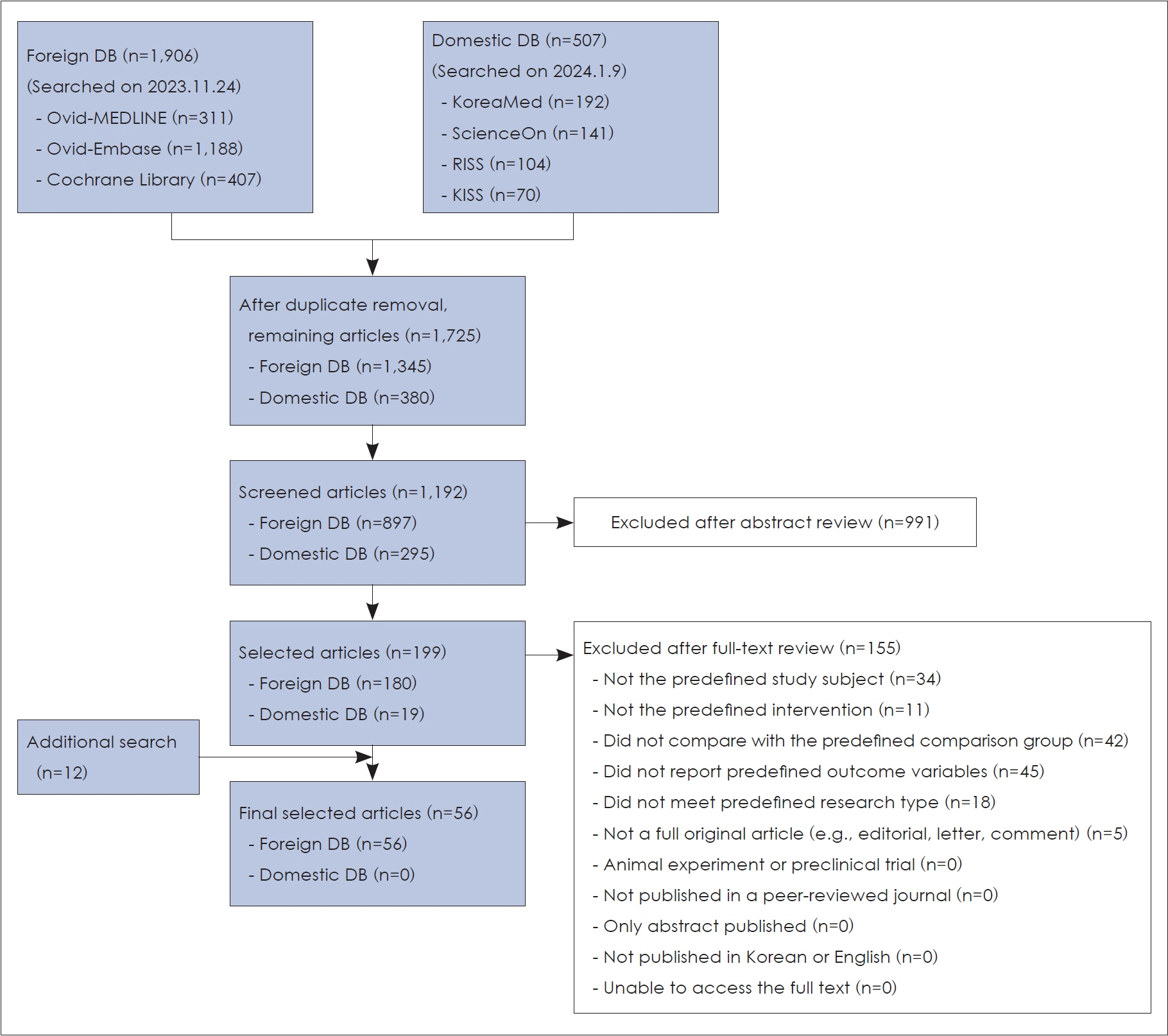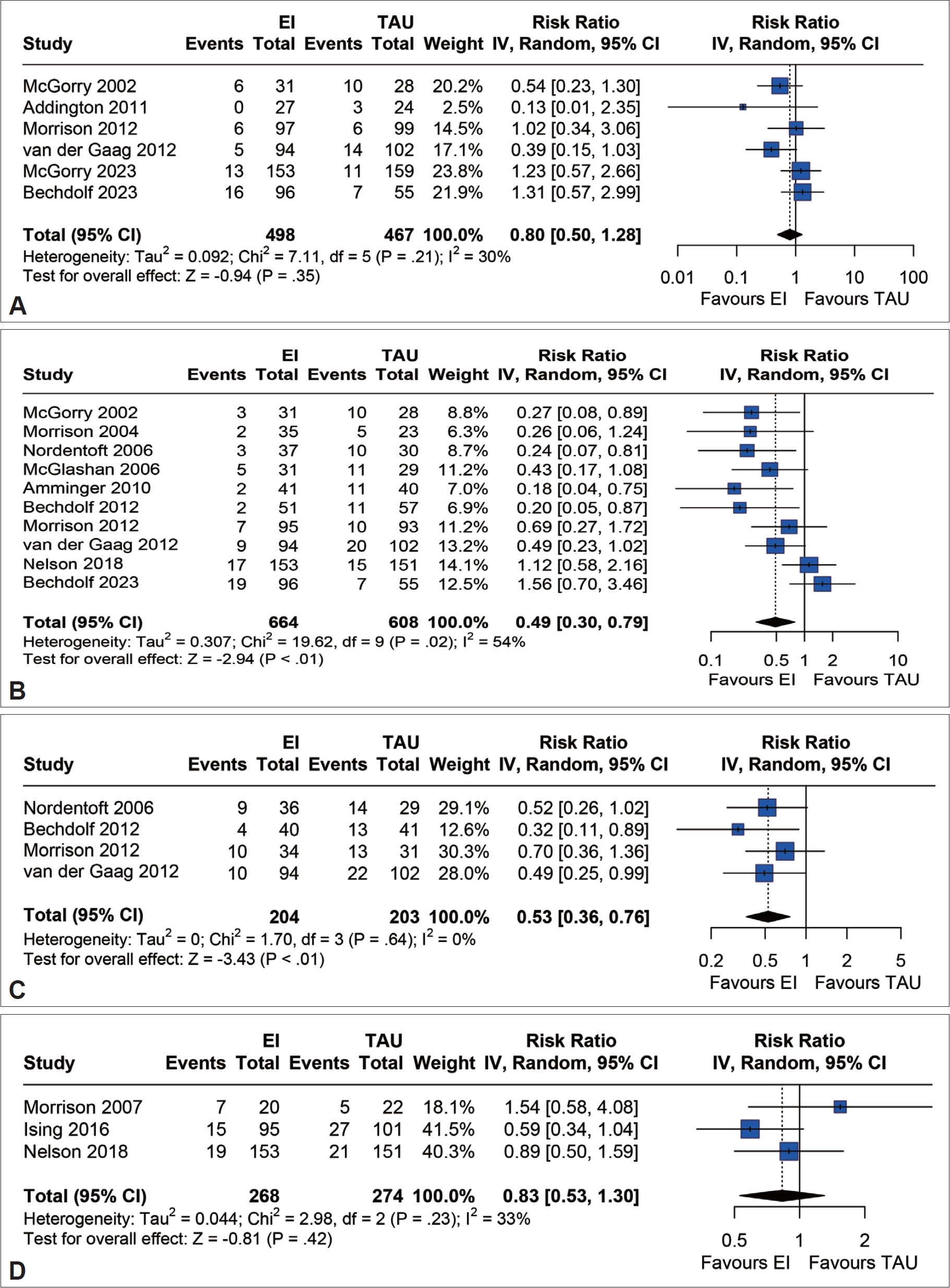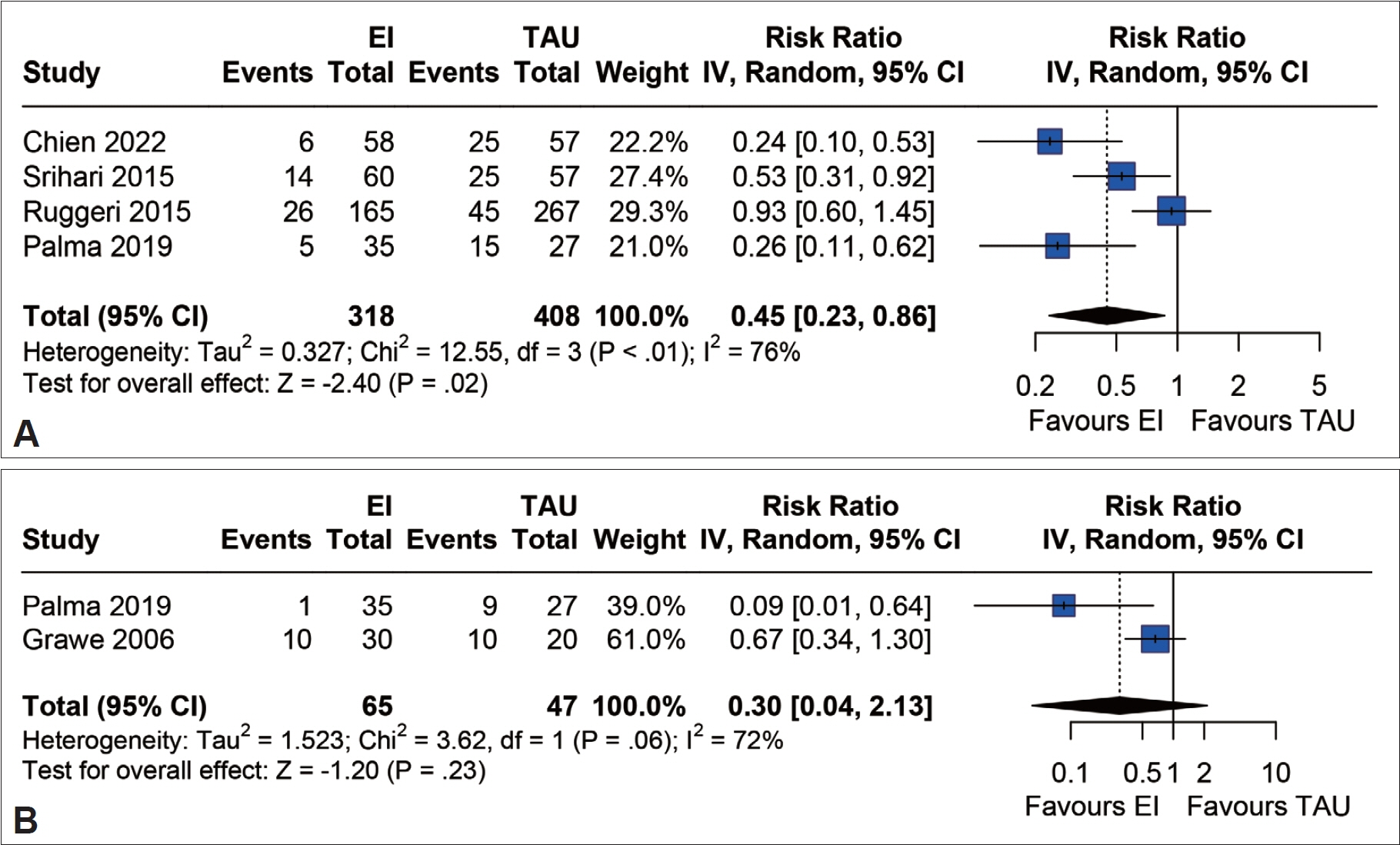Korean J Schizophr Res.
2024 Oct;27(2):35-48. 10.16946/kjsr.2024.27.2.35.
Recent Insights in the Treatment for Clinical High Risk for Psychosis and Recent Onset Psychosis
- Affiliations
-
- 1Department of Psychiatry, National Health Insurance Service Ilsan Hospital, Goyang, Korea
- 2Department of Psychiatry, Kangdong Sacred Heart Hospital, Seoul, Korea
- 3Department Clinical Epidemiology and Biostatistics, Asan Medical Center, University of Ulsan College of Medicine, Seoul, Korea
- 4Department Psychiatry, Asan Medical Center, University of Ulsan College of Medicine, Seoul, Korea
- 5Department of Psychiatry and Behavioral Neurosciences, Catholic Kwandong University International Saint Mary’s Hospital, Incheon, Korea
- KMID: 2560353
- DOI: http://doi.org/10.16946/kjsr.2024.27.2.35
Abstract
Objectives
This study aims to assess the effectiveness of early interventions in preventing psychosis transition, promoting remission, and reducing hospitalization rates in individuals at high risk for psychosis and those with recent onset psychosis (ROP).
Methods
A systematic review and meta-analysis were conducted, comparing early intervention strategies such as cognitive-behavioral therapy and psychosocial support to no intervention. The study focused on outcomes related to psychosis transition, remission rates, and prevention of psychiatric hospitalization.
Results
Although only a subset of clinical high risk (CHR) individuals transition to full psychosis, non-pharmacological treatments like cognitive-behavioral therapy are generally recommended as a first-line approach. In ROP patients, early pharmacological treatment reduces relapse rates, while psychosocial interventions aim to improve various functional outcomes. The meta-analysis results of this study did not show a significant reduction in psychosis transition rates with specialized interventions for CHR patients. For ROP patients, early interventions initially reduced hospitalization rates, but this effect was not sustained in mid-term follow-up results.
Conclusion
While early interventions offer short-term benefits in reducing psychosis transition and hospitalization, additional research is needed to determine their long-term effectiveness in functional recovery and overall patient outcomes.
Keyword
Figure
Reference
-
1. Kim SW. [Psychosocial intervention for patients with schizophrenia]. J Korean Neuropsychiatr Assoc. 2018; 57:235–243. Korea.
Article2. Perkins DO, Gu H, Boteva K, Lieberman JA. Relationship between duration of untreated psychosis and outcome in first-episode schizophrenia: a critical review and meta-analysis. Am J Psychiatry. 2005; 162:1785–1804.
Article3. Choi W, Joo SW, Ahn S, Choi YJ, Kim SM, Lee J. [One-year clinical outcomes after diagnosis according to early medication adherence in first-episode schizophrenia: a nationwide, health insurance data-based retrospective cohort study]. Korean J Schizophr Res. 2023; 26:24–31. Korean.
Article4. Cechnicki A, Cichocki Ł, Kalisz A, Błądziński P, Adamczyk P, Franczyk-Glita J. Duration of untreated psychosis (DUP) and the course of schizophrenia in a 20-year follow-up study. Psychiatry Res. 2014; 219:420–425.
Article5. Lim K, Lam M, Huang H, Liu J, Lee J. Genetic liability in individuals at ultra-high risk of psychosis: a comparison study of 9 psychiatric traits. PLoS One. 2020; 15:e0243104.
Article6. Schultze-Lutter F, Michel C, Schmidt SJ, Schimmelmann BG, Maric NP, Salokangas RK, et al. EPA guidance on the early detection of clinical high risk states of psychoses. Eur Psychiatry. 2015; 30:405–416.
Article7. Salazar de Pablo G, Radua J, Pereira J, Bonoldi I, Arienti V, Besana F, et al. Probability of transition to psychosis in individuals at clinical high risk: an updated meta-analysis. JAMA Psychiatry. 2021; 78:970–978.
Article8. Rek-Owodziń K, Tyburski E, Waszczuk K, Samochowiec J, Mak M. Neurocognition and social cognition—possibilities for diagnosis and treatment in ultra-high risk for psychosis state. Front Psychiatry. 2021; 12:765126.9. Breitborde NJ, Srihari VH, Woods SW. Review of the operational definition for first-episode psychosis. Early Interv Psychiatry. 2009; 3:259–265.
Article10. Erzın G, Gülöksüz S. Early interventions for clinical high-risk state for psychosis. Noro Psikiyatr Ars. 2021; 58(Suppl 1):S7–S11.11. McGorry PD, Mei C. Ultra-high-risk paradigm: lessons learnt and new directions. Evid Based Ment Health. 2018; 21:131–133.
Article12. Devoe DJ, Farris MS, Townes P, Addington J. Interventions and transition in youth at risk of psychosis: a systematic review and meta-analyses. J Clin Psychiatry. 2020; 81:17. r12053.13. Correll CU, Galling B, Pawar A, Krivko A, Bonetto C, Ruggeri M, et al. Comparison of early intervention services vs treatment as usual for early-phase psychosis: a systematic review, meta-analysis, and meta-regression. JAMA Psychiatry. 2018; 75:555–565.
Article14. Revell ER, Neill JC, Harte M, Khan Z, Drake RJ. A systematic review and meta-analysis of cognitive remediation in early schizophrenia. Schizophr Res. 2015; 168:213–222.
Article15. Heinssen RK, Goldstein AB, Azrin ST. Evidence-based treatments for first episode psychosis: components of coordinated specialty care. Bethesda: National Institute of Mental Health;2014.16. Kim SY, Park JE, Seo HJ, Lee YJ, Jang BH, Son HJ. [NECA’s guidance for undertaking systemic reviews and meta-analyses for intervention]. 1st ed. Seoul: National Evidence-based Healthcare Collaborating Agency;2011. Korean.17. Kane JM, Robinson DG, Schooler NR, Mueser KT, Penn DL, Rosenheck RA, et al. Comprehensive versus usual community care for first-episode psychosis: 2-year outcomes from the NIMH RAISE early treatment program. Am J Psychiatry. 2016; 173:362–372.
Article18. Nishida A, Ando S, Yamasaki S, Koike S, Ichihashi K, Miyakoshi Y, et al. A randomized controlled trial of comprehensive early intervention care in patients with first-episode psychosis in Japan: 1.5-year outcomes from the J-CAP study. J Psychiatr Res. 2018; 102:136–141.
Article19. Wessels H, Wagner M, Kuhr K, Berning J, Pützfeld V, Janssen B, et al. Predictors of treatment response to psychological interventions in people at clinical high risk of first-episode psychosis. Early Interv Psychiatry. 2019; 13:120–127.
Article20. Davies C, Cipriani A, Ioannidis JPA, Radua J, Stahl D, Provenzani U, et al. Lack of evidence to favor specific preventive interventions in psychosis: a network meta-analysis. World Psychiatry. 2018; 17:196–209.
Article21. McGorry PD, Yung AR, Phillips LJ, Yuen HP, Francey S, Cosgrave EM, et al. Randomized controlled trial of interventions designed to reduce the risk of progression to first-episode psychosis in a clinical sample with subthreshold symptoms. Arch Gen Psychiatry. 2002; 59:921–928.
Article22. Yung AR, McGorry PD, Francey SM, Nelson B, Baker K, Phillips LJ, et al. PACE: a specialised service for young people at risk of psychotic disorders. Med J Aust. 2007; 187(S7):S43–S46.
Article23. Bendall S, Killackey E, Jackson H, Gleeson J. Befriending manual. Melbourne: ORYGEN Research Centre;2003.24. Jackson HJ, McGorry PD, Killackey E, Bendall S, Allott K, Dudgeon P, et al. Acute-phase and 1-year follow-up results of a randomized controlled trial of CBT versus Befriending for first-episode psychosis: the ACE project. Psychol Med. 2008; 38:725–735.
Article25. French P, Morrison AP. Early detection and cognitive therapy for people at high risk of developing psychosis: a treatment approach. Chichester: John Wiley & Sons;2004.26. Morrison AP, French P, Walford L, Lewis SW, Kilcommons A, Green J, et al. Cognitive therapy for the prevention of psychosis in people at ultra-high risk: randomised controlled trial. Br J Psychiatry. 2004; 185:291–297.
Article27. van der Gaag M, Nieman DH, Rietdijk J, Dragt S, Ising HK, Klaassen RM, et al. Cognitive behavioral therapy for subjects at ultrahigh risk for developing psychosis: a randomized controlled clinical trial. Schizophr Bull. 2012; 38:1180–1188.
Article28. Rietdijk J, Dragt S, Klaassen R, Ising H, Nieman D, Wunderink L, et al. A single blind randomized controlled trial of cognitive behavioural therapy in a help-seeking population with an at risk mental state for psychosis: the Dutch early detection and intervention evaluation (EDIE-NL) trial. Trials. 2010; 11:30.
Article29. Stafford MR, Jackson H, Mayo-Wilson E, Morrison AP, Kendall T. Early interventions to prevent psychosis: systematic review and meta-analysis. BMJ. 2013; 346:f185.
Article30. Turner DT, van der Gaag M, Karyotaki E, Cuijpers P. Psychological interventions for psychosis: a meta-analysis of comparative outcome studies. Am J Psychiatry. 2014; 171:523–538.
Article31. Bird V, Premkumar P, Kendall T, Whittington C, Mitchell J, Kuipers E. Early intervention services, cognitive-behavioural therapy and family intervention in early psychosis: systematic review. Br J Psychiatry. 2010; 197:350–356.
Article32. Jackson H, McGorry P, Edwards J, Hulbert C, Henry L, Harrigan S, et al. A controlled trial of cognitively oriented psychotherapy for early psychosis (COPE) with four-year follow-up readmission data. Psychol Med. 2005; 35:1295–1306.
Article33. Frawley E, Cowman M, Lepage M, Donohoe G. Social and occupational recovery in early psychosis: a systematic review and meta-analysis of psychosocial interventions. Psychol Med. 2023; 53:1787–1798.
Article34. Devoe DJ, Farris MS, Townes P, Addington J. Interventions and social functioning in youth at risk of psychosis: a systematic review and meta-analysis. Early Interv Psychiatry. 2019; 13:169–180.
Article35. Fowler D, Hodgekins J, French P. Social recovery therapy in improving activity and social outcomes in early psychosis: current evidence and longer term outcomes. Schizophr Res. 2019; 203:99–104.
Article36. Lee M, Cernvall M, Borg J, Plavén-Sigray P, Larsson C, Erhardt S, et al. Cognitive function and variability in antipsychotic drug–naive patients with first-episode psychosis: a systematic review and metaanalysis. JAMA Psychiatry. 2024; 81:468–476.
Article37. Kurtz MM, Richardson CL. Social cognitive training for schizophrenia: a meta-analytic investigation of controlled research. Schizophr Bull. 2012; 38:1092–1104.
Article38. Donohoe G, Dillon R, Hargreaves A, Mothersill O, Castorina M, Furey E, et al. Effectiveness of a low support, remotely accessible, cognitive remediation training programme for chronic psychosis: cognitive, functional and cortical outcomes from a single blind randomised controlled trial. Psychol Med. 2018; 48:751–764.
Article39. Glenthøj LB, Hjorthøj C, Kristensen TD, Davidson CA, Nordentoft M. The effect of cognitive remediation in individuals at ultra-high risk for psychosis: a systematic review. NPJ Schizophr. 2017; 3:20.
Article40. Ventura J, Subotnik KL, Gretchen-Doorly D, Casaus L, Boucher M, Medalia A, et al. Cognitive remediation can improve negative symptoms and social functioning in first-episode schizophrenia: a randomized controlled trial. Schizophr Res. 2019; 203:24–31.
Article41. Miklowitz DJ, O’Brien MP, Schlosser DA, Addington J, Candan KA, Marshall C, et al. Family-focused treatment for adolescents and young adults at high risk for psychosis: results of a randomized trial. J Am Acad Child Adolesc Psychiatry. 2014; 53:848–858.
Article42. Leavey G, Gulamhussein S, Papadopoulos C, Johnson-Sabine E, Blizard B, King M. A randomized controlled trial of a brief intervention for families of patients with a first episode of psychosis. Psychol Med. 2004; 34:423–431.
Article43. Zhang M, Wang M, Li J, Phillips MR. Randomised-control trial of family intervention for 78 first-episode male schizophrenic patients. An 18-month study in Suzhou, Jiangsu. Br J Psychiatry Suppl. 1994; 24:96–102.44. Bergström T, Seikkula J, Alakare B, Mäki P, Köngäs-Saviaro P, Taskila JJ, et al. The family-oriented open dialogue approach in the treatment of first-episode psychosis: nineteen-year outcomes. Psychiatry Res. 2018; 270:168–175.
Article45. Seikkula J, Olson ME. The open dialogue approach to acute psychosis: its poetics and micropolitics. Fam Process. 2003; 42:403–418.
Article46. Lecomte T, Leclerc C, Corbière M, Wykes T, Wallace CJ, Spidel A. Group cognitive behavior therapy or social skills training for individuals with a recent onset of psychosis? Results of a randomized controlled trial. J Nerv Ment Dis. 2008; 196:866–875.
Article47. Kopelowicz A, Liberman RP, Zarate R. Recent advances in social skills training for schizophrenia. Schizophr Bull. 2006; 32(Suppl 1):S12–S23.
Article48. van der Gaag M, Smit F, Bechdolf A, French P, Linszen DH, Yung AR, et al. Preventing a first episode of psychosis: meta-analysis of randomized controlled prevention trials of 12 month and longer-term follow-ups. Schizophr Res. 2013; 149:56–62.
Article49. Andreou C, Bailey B, Borgwardt S. Assessment and treatment of individuals at high risk for psychosis. BJPsych Adv. 2019; 25:177–184.
Article50. Alvarez-Jiménez M, Parker AG, Hetrick SE, McGorry PD, Gleeson JF. Preventing the second episode: a systematic review and meta-analysis of psychosocial and pharmacological trials in first-episode psychosis. Schizophr Bull. 2011; 37:619–630.
Article51. Gómez-Revuelta M, Pelayo-Terán JM, Juncal-Ruiz M, Vázquez-Bourgon J, Suárez-Pinilla P, Romero-Jiménez R, et al. Antipsychotic treatment effectiveness in first episode of psychosis: PAFIP 3-year follow-up randomized clinical trials comparing haloperidol, olanzapine, risperidone, aripiprazole, quetiapine, and ziprasidone. Int J Neuropsychopharmacol. 2020; 23:217–229.
Article52. Zhang JP, Gallego JA, Robinson DG, Malhotra AK, Kane JM, Correll CU. Efficacy and safety of individual second-generation vs. first-generation antipsychotics in first-episode psychosis: a systematic review and meta-analysis. Int J Neuropsychopharmacol. 2013; 16:1205–1218.
Article53. Amminger GP, Schäfer MR, Papageorgiou K, Klier CM, Cotton SM, Harrigan SM, et al. Long-chain omega-3 fatty acids for indicated prevention of psychotic disorders: a randomized, placebo-controlled trial. Arch Gen Psychiatry. 2010; 67:146–154.
Article54. Amminger GP, Chanen AM, Ohmann S, Klier CM, Mossaheb N, Bechdolf A, et al. Omega-3 fatty acid supplementation in adolescents with borderline personality disorder and ultra-high risk criteria for psychosis: a post hoc subgroup analysis of a double-blind, randomized controlled trial. Can J Psychiatry. 2013; 58:402–408.
Article55. Nelson B, Amminger GP, Yuen HP, Markulev C, Lavoie S, Schäfer MR, et al. NEURAPRO: a multi-centre RCT of omega-3 polyunsaturated fatty acids versus placebo in young people at ultra-high risk of psychotic disorders-medium-term follow-up and clinical course. NPJ Schizophr. 2018; 4:11.
Article56. Chen AT, Chibnall JT, Nasrallah HA. A meta-analysis of placebo-controlled trials of omega-3 fatty acid augmentation in schizophrenia: possible stage-specific effects. Ann Clin Psychiatry. 2015; 27:289–296.57. Firth J, Rosenbaum S, Ward PB, Curtis J, Teasdale SB, Yung AR, et al. Adjunctive nutrients in first-episode psychosis: a systematic review of efficacy, tolerability and neurobiological mechanisms. Early Interv Psychiatry. 2018; 12:774–783.
Article58. Ingole S, Belorkar N, Waradkar P, Shrivastava M. Role of ascorbic acid supplementation on prevention of olanzapine induced metabolic side effects in schizophrenic patients. Indian J Public Health Res Dev. 2011; 2:12–16.59. Morrison AP, French P, Parker S, Roberts M, Stevens H, Bentall RP, et al. Three-year follow-up of a randomized controlled trial of cognitive therapy for the prevention of psychosis in people at ultrahigh risk. Schizophr Bull. 2007; 33:682–687.
Article60. Addington J, Epstein I, Liu L, French P, Boydell KM, Zipursky RB. A randomized controlled trial of cognitive behavioral therapy for individuals at clinical high risk of psychosis. Schizophr Res. 2011; 125:54–61.
Article61. Ising HK, Kraan TC, Rietdijk J, Dragt S, Klaassen RM, Boonstra N, et al. Four-year follow-up of cognitive behavioral therapy in persons at ultra-high risk for developing psychosis: the Dutch early detection intervention evaluation (EDIE-NL) trial. Schizophr Bull. 2016; 42:1243–1252.
Article62. McGorry PD, Mei C, Amminger GP, Yuen HP, Kerr M, Spark J, et al. A sequential adaptive intervention strategy targeting remission and functional recovery in young people at ultrahigh risk of psychosis: the staged treatment in early psychosis (STEP) sequential multiple assignment randomized trial. JAMA Psychiatry. 2023; 80:875–885.
Article63. Hansen HG, Starzer M, Nilsson SF, Hjorthøj C, Albert N, Nordentoft M. Clinical recovery and long-term association of specialized early intervention services vs treatment as usual among individuals with first-episode schizophrenia spectrum disorder: 20-year followup of the OPUS trial. JAMA Psychiatry. 2023; 80:371–379.
Article64. Bertelsen M, Jeppesen P, Petersen L, Thorup A, Øhlenschlaeger J, le Quach P, et al. Five-year follow-up of a randomized multicenter trial of intensive early intervention vs standard treatment for patients with a first episode of psychotic illness: the OPUS trial. Arch Gen Psychiatry. 2008; 65:762–771.
Article65. Sigrúnarson V, Gråwe RW, Morken G. Integrated treatment vs. treatment-as-usual for recent onset schizophrenia; 12 year follow-up on a randomized controlled trial. BMC Psychiatry. 2013; 13:200.66. Grawe RW, Falloon IR, Widen JH, Skogvoll E. Two years of continued early treatment for recent-onset schizophrenia: a randomised controlled study. Acta Psychiatr Scand. 2006; 114:328–336.
Article67. Palma C, Farriols N, Frías A, Cañete J, Gomis O, Fernández M, et al. Randomized controlled trial of cognitive-motivational therapy program (PIPE) for the initial phase of schizophrenia: maintenance of efficacy at 5-year follow up. Psychiatry Res. 2019; 273:586–594.
Article68. Petersen L, Nordentoft M, Jeppesen P, Ohlenschaeger J, Thorup A, Christensen TØ, et al. Improving 1-year outcome in first-episode psychosis: OPUS trial. Br J Psychiatry Suppl. 2005; 48:s98–s103.69. Secher RG, Hjorthøj CR, Austin SF, Thorup A, Jeppesen P, Mors O, et al. Ten-year follow-up of the OPUS specialized early intervention trial for patients with a first episode of psychosis. Schizophr Bull. 2015; 41:617–626.
Article70. McGorry PD, Nelson B, Phillips LJ, Yuen HP, Francey SM, Thampi A, et al. Randomized controlled trial of interventions for young people at ultra-high risk of psychosis: twelve-month outcome. J Clin Psychiatry. 2013; 74:349–356.
Article71. Srihari VH, Tek C, Kucukgoncu S, Phutane VH, Breitborde NJ, Pollard J, et al. First-episode services for psychotic disorders in the U.S. public sector: a pragmatic randomized controlled trial. Psychiatr Serv. 2015; 66:705–712.
Article
- Full Text Links
- Actions
-
Cited
- CITED
-
- Close
- Share
- Similar articles
-
- Importance of Early Detection in Early Psychosis
- Late-Onset Psychosis; Is It Real?
- Symptom Remission Related to Increased Drug Response after Conversion Into Schizophrenia in Early Psychosis : A Case Report
- Relations of Self-Esteem with Paranoia in Healthy Controls, Individuals at Ultra-High Risk for Psychosis and with Recent Onset Schizophrenia
- Mirtazapine Monotherapy for Antipsychotics-refractory Psychosis in a Patient with Very-late-onset Schizophrenia-like Psychosis: A Case Report




